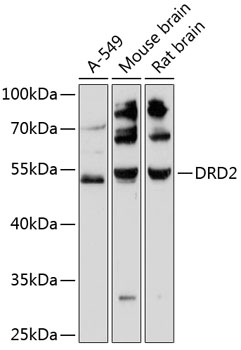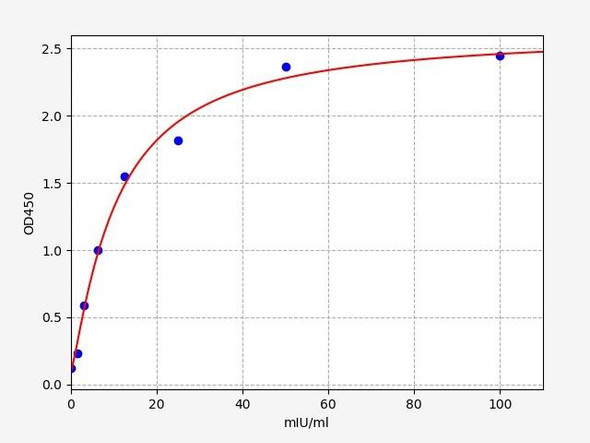Anti-DRD2 Antibody (CAB12930)
- SKU:
- CAB12930
- Product type:
- Antibody
- Reactivity:
- Human
- Mouse
- Rat
- Host Species:
- Rabbit
- Isotype:
- IgG
- Antibody Type:
- Polyclonal Antibody
- Research Area:
- Cell Biology
Description
| Antibody Name: | Anti-DRD2 Antibody |
| Antibody SKU: | CAB12930 |
| Antibody Size: | 20uL, 50uL, 100uL |
| Application: | WB |
| Reactivity: | Human, Mouse, Rat |
| Host Species: | Rabbit |
| Immunogen: | Recombinant fusion protein containing a sequence corresponding to amino acids 214-373 of human DRD2 (NP_000786.1). |
| Application: | WB |
| Recommended Dilution: | WB 1:500 - 1:1000 |
| Reactivity: | Human, Mouse, Rat |
| Positive Samples: | A-549, Mouse brain, Rat brain |
| Immunogen: | Recombinant fusion protein containing a sequence corresponding to amino acids 214-373 of human DRD2 (NP_000786.1). |
| Purification Method: | Affinity purification |
| Storage Buffer: | Store at -20°C. Avoid freeze / thaw cycles. Buffer: PBS with 0.02% sodium azide, 50% glycerol, pH7.3. |
| Isotype: | IgG |
| Sequence: | IVLR RRRK RVNT KRSS RAFR AHLR APLK GNCT HPED MKLC TVIM KSNG SFPV NRRR VEAA RRAQ ELEM EMLS STSP PERT RYSP IPPS HHQL TLPD PSHH GLHS TPDS PAKP EKNG HAKD HPKI AKIF EIQT MPNG KTRT SLKT MSRR KLSQ QKEK KATQ |
| Gene ID: | 1813 |
| Uniprot: | P14416 |
| Cellular Location: | Cell membrane, Multi-pass membrane protein |
| Calculated MW: | 47kDa/50kDa |
| Observed MW: | 54kDa |
| Synonyms: | DRD2, D2DR, D2R |
| Background: | This gene encodes the D2 subtype of the dopamine receptor. This G-protein coupled receptor inhibits adenylyl cyclase activity. A missense mutation in this gene causes myoclonus dystonia; other mutations have been associated with schizophrenia. Alternative splicing of this gene results in two transcript variants encoding different isoforms. A third variant has been described, but it has not been determined whether this form is normal or due to aberrant splicing. |
| UniProt Protein Function: | DRD2: Dopamine receptor whose activity is mediated by G proteins which inhibit adenylyl cyclase. Defects in DRD2 are associated with dystonia type 11 (DYT11); also known as alcohol-responsive dystonia. DYT11 is a myoclonic dystonia. Dystonia is defined by the presence of sustained involuntary muscle contractions, often leading to abnormal postures. DYT11 is characterized by involuntary lightning jerks and dystonic movements and postures alleviated by alcohol. Inheritance is autosomal dominant. The age of onset, pattern of body involvement, presence of myoclonus and response to alcohol are all variable. Belongs to the G-protein coupled receptor 1 family. 3 isoforms of the human protein are produced by alternative splicing. |
| UniProt Protein Details: | Protein type:Receptor, GPCR; GPCR, family 1; Membrane protein, multi-pass; Membrane protein, integral Chromosomal Location of Human Ortholog: 11q23 Cellular Component: axon; dendrite; integral to plasma membrane; nonmotile primary cilium; plasma membrane; synaptic vesicle membrane Molecular Function:adrenoceptor activity; dopamine binding; dopamine D2 receptor-like receptor activity; drug binding; identical protein binding; protein binding Biological Process: adenohypophysis development; adult walking behavior; arachidonic acid secretion; associative learning; axonogenesis; behavioral response to cocaine; behavioral response to ethanol; branching morphogenesis of a nerve; cerebral cortex GABAergic interneuron migration; circadian regulation of gene expression; dopamine metabolic process; dopamine receptor, adenylate cyclase inhibiting pathway; dopamine receptor, phospholipase C activating pathway; locomotory behavior; negative regulation of blood pressure; negative regulation of cell migration; negative regulation of cell proliferation; negative regulation of dopamine receptor signaling pathway; negative regulation of protein kinase B signaling cascade; negative regulation of protein secretion; negative regulation of synaptic transmission, glutamatergic; nerve-nerve synaptic transmission; peristalsis; phosphatidylinositol metabolic process; positive regulation of cytokinesis; positive regulation of dopamine uptake; positive regulation of growth hormone secretion; positive regulation of neuroblast proliferation; prepulse inhibition; protein localization; reduction of cytosolic calcium ion concentration; regulation of cAMP metabolic process; regulation of dopamine secretion; regulation of dopamine uptake; regulation of heart rate; regulation of long-term neuronal synaptic plasticity; regulation of potassium ion transport; regulation of sodium ion transport; regulation of synaptic transmission, GABAergic; regulation of systemic arterial blood pressure by neurological process; release of sequestered calcium ion into cytosol; response to amphetamine; response to cocaine; response to drug; response to light stimulus; response to morphine; response to toxin; sensory perception of smell; synaptic transmission, dopaminergic; synaptogenesis; thermoregulation; visual learning Disease: Myoclonic Dystonia |
| NCBI Summary: | This gene encodes the D2 subtype of the dopamine receptor. This G-protein coupled receptor inhibits adenylyl cyclase activity. A missense mutation in this gene causes myoclonus dystonia; other mutations have been associated with schizophrenia. Alternative splicing of this gene results in two transcript variants encoding different isoforms. A third variant has been described, but it has not been determined whether this form is normal or due to aberrant splicing. [provided by RefSeq, Jul 2008] |
| UniProt Code: | P14416 |
| NCBI GenInfo Identifier: | 118206 |
| NCBI Gene ID: | 1813 |
| NCBI Accession: | P14416.2 |
| UniProt Secondary Accession: | P14416,Q9NZR3, Q9UPA9, |
| UniProt Related Accession: | P14416 |
| Molecular Weight: | 50,847 Da |
| NCBI Full Name: | D(2) dopamine receptor |
| NCBI Synonym Full Names: | dopamine receptor D2 |
| NCBI Official Symbol: | DRD2 |
| NCBI Official Synonym Symbols: | D2R; D2DR |
| NCBI Protein Information: | D(2) dopamine receptor |
| UniProt Protein Name: | D(2) dopamine receptor |
| UniProt Synonym Protein Names: | Dopamine D2 receptor |
| Protein Family: | D(2) dopamine receptor |
| UniProt Gene Name: | DRD2 |
| UniProt Entry Name: | DRD2_HUMAN |










